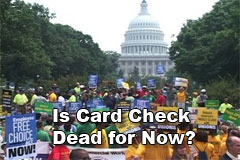“Support evaporated as Democrats from places as dissimilar as Arkansas and California thought hard about what life would be like with card check,” Barone said. “Today, the bill looks dead no matter how many Democrats are elected to Congress.”
 Barone believes with weakening overall support and the prospect of Republican gains in the 2010 Congressional elections, the chances of a card check law passing in the near term have faded dramatically. Barone believes with weakening overall support and the prospect of Republican gains in the 2010 Congressional elections, the chances of a card check law passing in the near term have faded dramatically.
Meanwhile, sensing a drop in card check legislation momentum in Washington DC, labor groups are now focusing more efforts on similar legislation at the state level.
This summer, for example, Oregon passed the Worker Freedom Act, which prohibits companies from holding mandatory employee meetings to talk about organizing – very similar to another of the provisions of the Employee Free Choice Act.
Employers say mandatory meetings, known as "captive audience meetings," are necessary to counter misleading information disseminated by union organizers. Unions say employers use the meetings to gauge worker sympathies and pressure workers not to join the union.
The Oregon law is scheduled to take effect in January, and business groups are mounting court challenges to its enforcement. All this is making Oregon something of a “test case” to see how such legislation plays out in the courts and the real world.
Similar legislation prohibiting mandatory workplace meetings about union organizing passed this year in the Connecticut Senate and the Michigan House, both controlled by Democrats, but stalled in the other chambers of the state legislatures.
In Hawaii, a card check provision was signed into law over the veto of the Republican governor's veto in August, though it only applies to agriculture and public-sector workers.
What do you think the fate of the card check legislation will be? Why? What do you think of labor now pushing for similar legislation at the state level? Let us know your thoughts at the Feedback button below.
SCDigest is Twittering!
Follow us now at https://twitter.com/scdigest
|